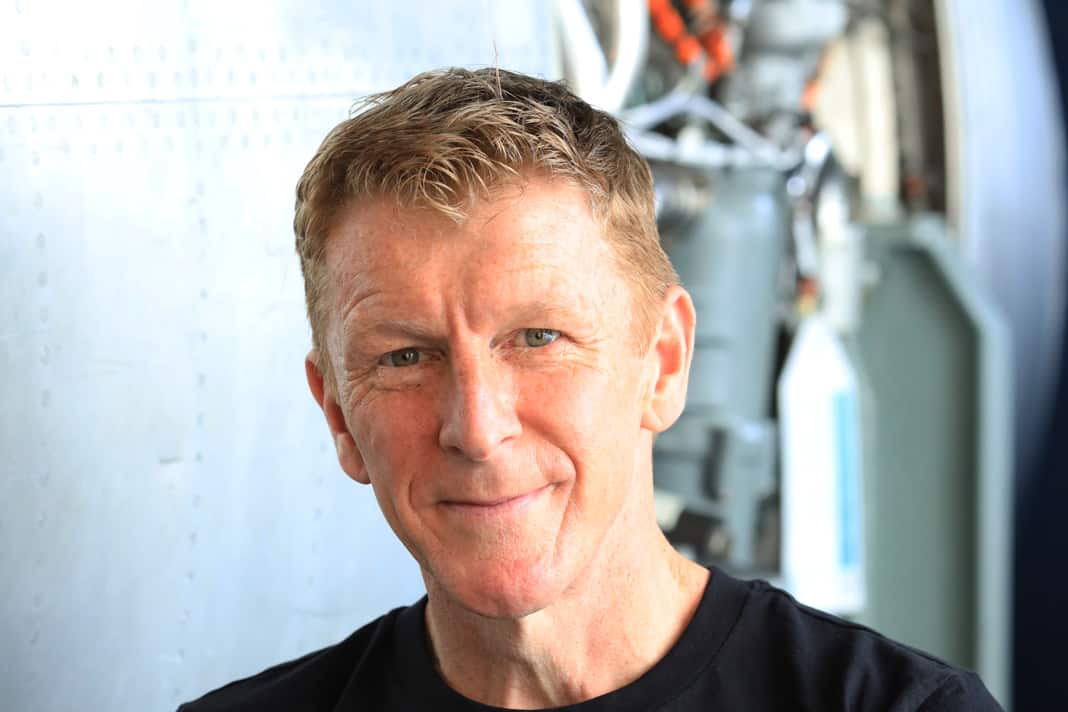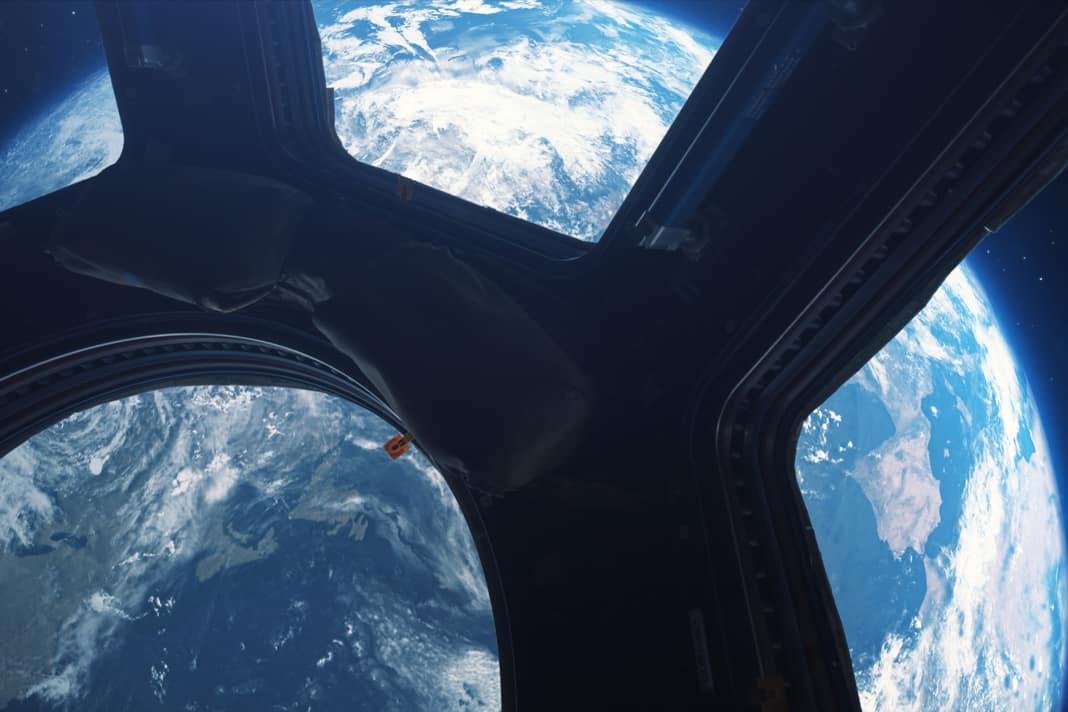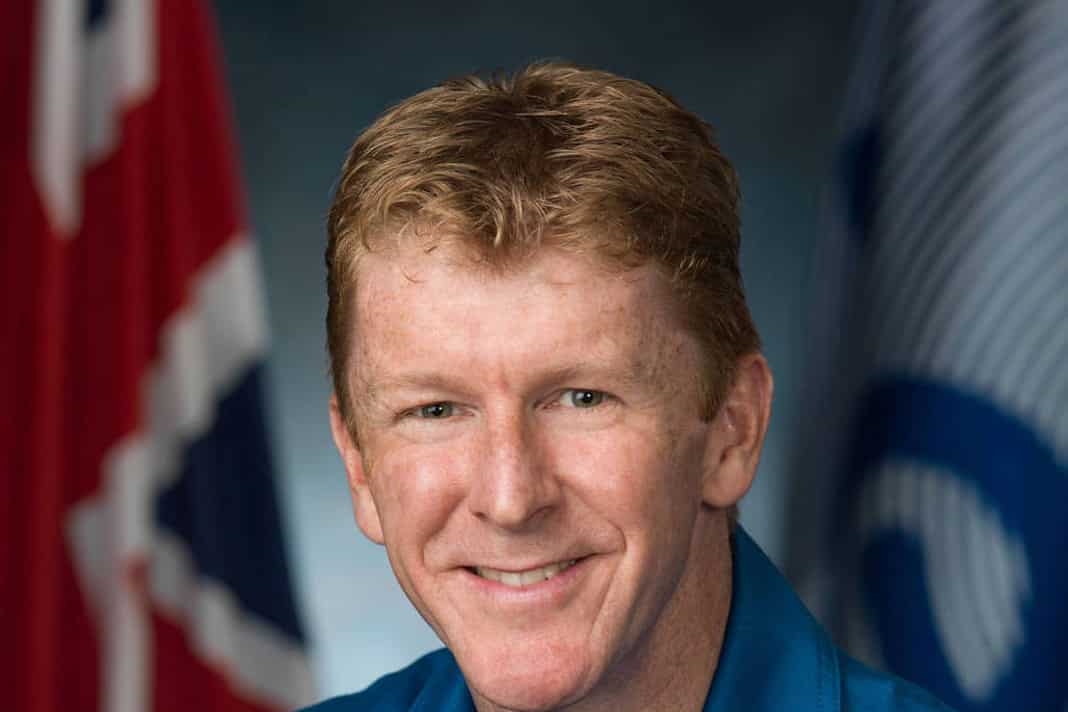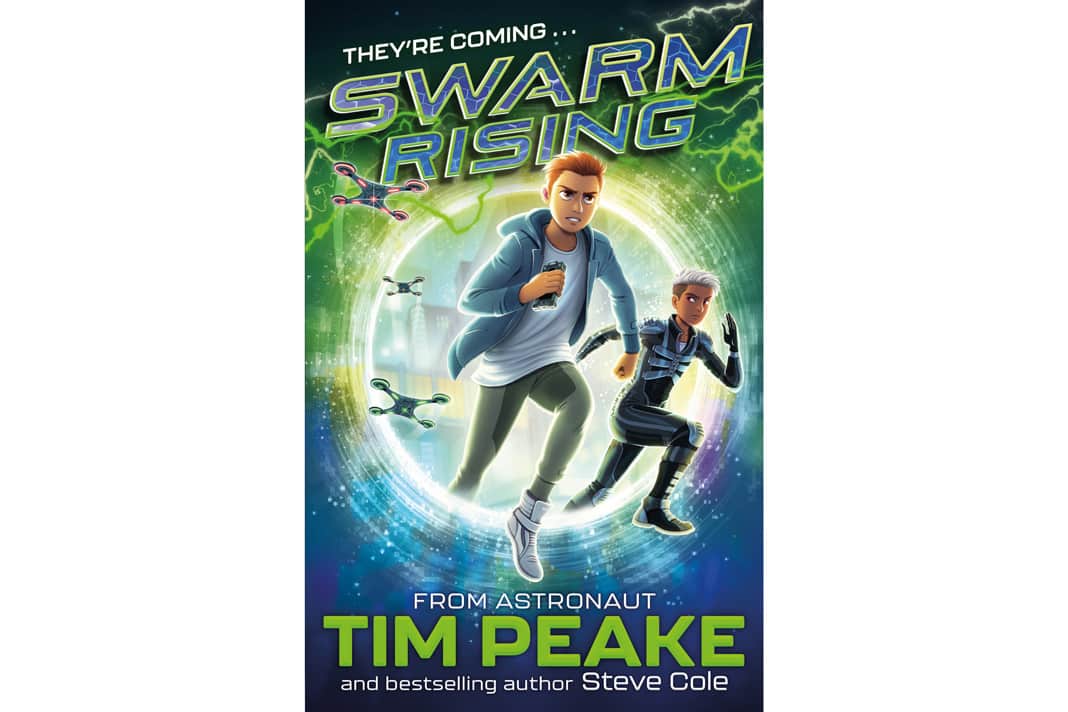Tim Peake is a hero to any UK boy or girl who dreams of space, and now he’s branched out into children’s fiction. Absolutely Education meets a real-life rocket man
Words Libby Norman
Tim Peake needs very little introduction. He is the first British European Space Agency astronaut. He’s also the sixth person born in the UK to make it to the International Space Station and the seventh UK-born astronaut to go into space. He’s our own homegrown rocket man.
He’s still on the ESA list (so could return), but since he touched down he’s made it part of his mission to inspire young people about the future possibilities of space. Now, he’s published his first foray into fiction. A collaboration with bestselling author Steve Cole, Swarm Rising is a nail-biting adventure through time and space to save our planet.
The most striking thing about Tim Peake is how modest he is – you could say he’s grounded. He is also very frank about his own circuitous journey into space. He says: “Mine is a really encouraging story to tell”. And it is, because on paper he didn’t have the potential for such an elite field. He believes it’s good for young people to know his wasn’t a smooth run-in to astronaut training school. “I think it’s important to try and relieve some of that burden that sometimes teenagers feel – that their entire future rests on some exams you do when you are 17 years old. I say to people, ‘look, I got a C, a D and an E at A level. I left school at 18 and I went and joined the Army’ – I think young people find it encouraging to hear that.”
“I say to people, ‘look, I got a C, a D and an E at A level. I left school at 18’ – I think young people find it encouraging to hear that”
Major Tim Peake did shine in the Army as a pilot, clocking up 17 years’ service after leaving Sandhurst and some 3,000 flying hours. “Ultimately I did need a degree. I got my degree in Flight Dynamics when I was 33, and I was back in evening school doing Mathematics in my early 30s to get myself up to standard.” This is, of course, inspiring stuff because Tim Peake gets the issues today’s young people face. “There’s an awful lot of stress and pressure on teenagers these days to do their exams, know the right things, think about the future. And sometimes you can just relax, just do what you’re passionate about. Yes, work hard, but if things don’t work out the way you hope when you’re 17 or 18 it doesn’t mean that you can’t go on and achieve what you want to achieve. There are always different ways of doing things, different routes to take.”

This is one reason he is Ambassador for both the Prince’s Trust and the Scouts – believing that the work they do is one way in which young people find that different route, discover their talents. “I felt that I was very fortunate when I was growing up. I was at a state school and I was given opportunities. The school had a Cadet Force and there was a Scout group I could join. It’s these kinds of opportunities that we only really have because we’ve got brilliant volunteers who are prepared to dedicate time and effort into helping young people.”
Tim Peake is mindful, too, of the inequalities – always there, but in sharper relief since the pandemic – with access to the spaces outside classrooms where young people find their strengths. “Organisations like the Prince’s Trust and the Scouts, who work across the board in all areas of the UK, they give young people of different ages the ability to be able to say, ‘I’m going to do this – I’m going to get outside’.”

The outdoors aspect is vital, but so too is the teamwork and challenge on offer. “When I talk to people about being an astronaut, they talk about the selection process. I say to them, ‘do you realise that in terms of academic qualifications that was literally just a line on the application form?’. Then there was a year of selection process, which was all about soft skills. It was all about communication, teamwork, leadership, followership, personality, character. And this is all stuff that you don’t necessarily learn in the classroom. It’s stuff that you might learn on the sports pitch, or you might learn it outdoors doing adventurous activities.”
That period of selection that Tim Peake is talking about (and he was one of six selected from 8,000 applicants), was a test indeed. There were the academic, fitness and interview hurdles, but also a protracted spell living in cave systems in Sardinia. This was the stuff that was designed to replicate the isolated conditions and teamwork space missions require.
Of course, it’s one thing living in a cave with support available should things go wrong, quite another to be in space when the worst happens. Fear is something Tim Peake gets asked about a lot. “People say: ‘were you not afraid at any stage?’ and it’s an important question,” he says. “You’re only afraid when you don’t have options. Things go wrong all the time – it’s part of life. If you’re prepared for things to go wrong, then you no longer feel afraid of that situation because you’re almost expecting it to happen. You’ve got a little toolbox as you go through life that you keep adding to and that toolbox gives you skills to be able to deal with situations as they crop up. Our job as astronauts is to try and have a good enough toolbox to give us options for when things go wrong.”

That “toolbox” is clearly something that set him apart as a candidate, but he sees a bigger issue here for young people. “We have gone through a period of being quite risk averse and I think it’s important to maintain perspective on that and to accept that life is all about taking risk. It’s about managing risks and it’s about understanding risks so that you can do things that push you out of your comfort zone, because that’s what builds resilience,” he says. “You don’t do things in a foolhardy way, you do it in a way that you’ve analysed the risk and you’ve mitigated it and you’re prepared to do things as safely as possible, but you’re still going to go out there and have fun and take a bit of risk.”
“Our job as astronauts is to try and have a good enough toolbox to give us options for when things go wrong”
As a child, he watched the Shuttle launch and the Mir Space Station being built, and then Helen Sharman head into space on a commercial flight, but never dreamed he would have the opportunity. “Like most Brits I grew up thinking that’s something we’ll watch other people doing,” he says. What’s different today is that young people do have opportunities – and that’s something that gives him heart. “Anybody today can think of applying. We have a European Space Agency selection programme running and we’ve had 2,000 Brits apply out of a 20,000 total – so 10 per cent of applicants have been Brits. It was really quite strict in terms of applicant requirements. They needed a Master’s in Education and with specific knowledge in sciences, languages, and so on. So that’s 2,000 really high-calibre British applicants, which is great to see.”
There remains no doubt that children dream big, and they are never short of questions – also never afraid to ask questions adults are too embarrassed to ask. “Aliens definitely crop up a lot. So do human functions. Young people are always interested in how they would live in space,” he says. “I love the way young people have the ability to be less restricted about asking questions like that because they just put themselves in that environment.”
And if you’re wondering, Tim Peake does believe that alien life is a burning question worth asking. “I always say, ‘well, that’s a really intelligent question because some of the best brains on the planet right now are trying to answer that’. We’ve got radio telescopes listening out for signals from space. We’ve got rovers scouring Mars looking for signs of microbial life, past or even present. So it has to, I think, statistically. We had the Kepler space telescope operating for nine years looking for other planets just in the Milky Way that were in the Goldilocks Zone – that region where water can exist as liquid water – and we found over 2,000 planets. And actually, astronomers have now used much more data than that and they reckon there are 40 billion habitable planets just in our Milky Way.”

This brings us neatly on to Swarm Rising, which presents a scenario just brimming with ideas to inspire young minds to think about alien life forms, other worlds. “The paradox that’s interesting is, well, if it is out there, why do we still know nothing about it? This is where Steve Cole and I had so much fun with Swarm Rising. Some of the problems are just the vastness of space in terms of time and distance. At the moment we think that the speed of light is a limiting factor. But if you can travel at the speed of light – don’t think about travelling there as organic flesh and blood, think about travelling there as a digital intelligence, a digital signal – then it opens up a whole different ball game. So that’s where the inspiration came from.”
“I love the fact that children can have ideas, they can explore ideas – and space allows them to do that”
It was, he says, a liberating experience to look at space from a fictional perspective. “Up until now I’ve been writing very factual books and I want to be technically as accurate as I can be in what I’m writing. Fiction is great because you can let your imagination run wild and explore different concepts and ideas and have fun.” The idea for Swarm Rising had been brewing for some time, but there was input from others, notably his own sons, aged 12 and nine. “I had lots and lots of input from my two boys,” he says. “On long car journeys I’d be bouncing ideas off them.”
He says discussions about space are a great equaliser. “You can just let your imagination run wild and frankly no adult can tell you no, that’s not so. It’s a great leveller – nobody knows the answers to these questions yet and that’s why it’s so wonderful to interact with children and young adults about it,” he says. “I love the fact that they can have ideas, they can explore ideas – and space allows them to do that.” His collaboration with Steve Cole (whose credits include Astrosaurs and Dr Who novels) is also a brilliant springboard. “He’s been so wonderful to work with. It’s great having someone likeminded who’s prepared to have a bit of fun with science fiction but also keep it really grounded – and with some really good values about artificial intelligence, about our environment, about what it means to be human.”
Their sequel (Swarm Enemies) is underway, so the gripping narrative of hive minds and digital travel will continue. Back in the real (not digital) universe, Tim Peake knows that the biggest question of all from every child, is what it feels like to lift off from earth. His answer? “It’s incredibly exciting. The ride is insane. It’s just sheer power – high adrenaline, a lot of fun, g-forces, acceleration. And then when that’s over, when the engines cut out and everything goes quiet and still, you look out and you’re in orbit. It’s absolutely mesmerising – unbelievable.”

Swarm Rising, by Steve Cole and Tim Peake, is published by Hachette, price £12.99; hachette.co.uk
Further reading: Cressida Cowell on the magical powers of reading
You may also like...























